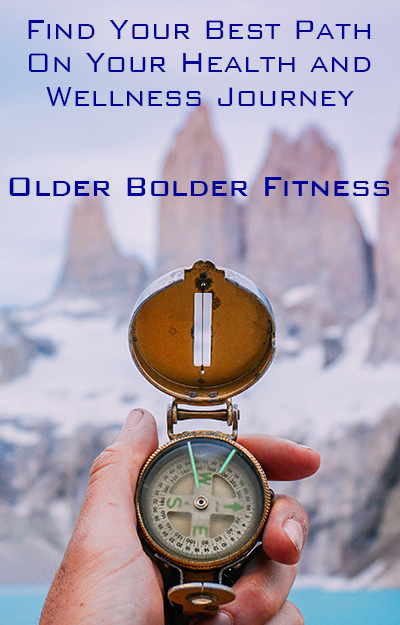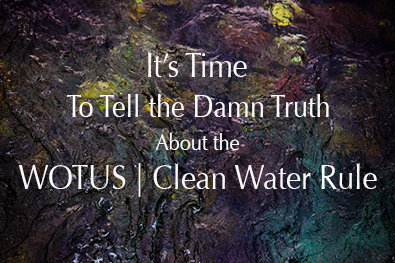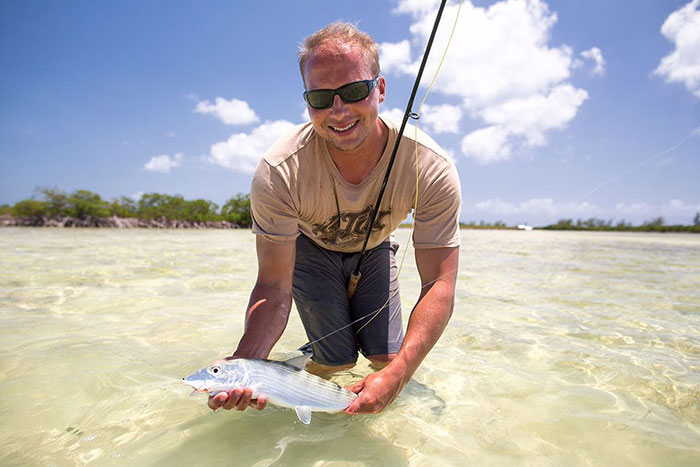
Travis Van Leeuwen with a bonefish caught on a flat in Eleuthera, The Bahamas
Several weeks ago I posted the video above, which is well worth a gander if you missed it, and subsequently opened an interesting conversation with Travis van Leeuwen, PhD of the Cape Eleuthera Institute in The Bahamas.
He was kind enough to take time from his very busy schedule to pound out answers to a series of questions (more tomorrow) and share some of the nifty work they’re doing in the bonefish world.
From your recent bonefish video we posted here, you mentioned first dabbling in fly fishing at the young age of 10; what are your first and most formative memories learning to fly fish around home?
Growing up in Port Moody, BC, Canada, on the outskirts of Vancouver, I targeted salmon and trout in our local streams and estuaries; however, one particular fishing moment stands out early on as a young boy. One October when the Coho salmon were running in my local bay/estuary I showed up early in the morning with my leaky hip waders and the Shakespeare packaged fly rod combo I talked about in the video. I remember the air temperature was cool, the tide was low and I remember the anticipation as fish began porpoising as the early morning mist swirled and slowly lifted from the water. I fished, along with an older, seasoned fly-fisher, for a few hours but we had caught nothing. I then decided to tie on this strange looking purple fly (to this day I have no idea what it’s called) that was more reminiscent of an Atlantic salmon fly. Almost instantly I hooked up on a fish that proceeded to scream my reel into the pink backing – to this day I can still remember the different tones of the reel as the bearings inside were being put through their paces. As the fish stopped running and I began reeling, I soon realized in an adrenalin fueled rush that I had put my reel on backwards and that the combo I bought was probably not meant for salmon fishing. I never landed the fish or the four others I proceeded to hook up on over the next 30 min. Funnily enough, I ran into this same “seasoned fly-fisher” on the Sunshine Coast, Sechelt, BC, Canada where I was doing my MSc fieldwork at the time some 13 years later. He still remembered me and we joked about this day as he commented on how much better my fishing gear had gotten over the years.
Please share a bit about your education / training / professional background.
I earned a BSc in biology at Simon Fraser University, Canada, an MSc at the University of British Columbia, Canada and I was awarded a doctorate and post doctorate at the University of Glasgow, Scotland, UK. Most of my theses work has been on salmon and trout. For my MSc I looked at the physiological basis of habitat partitioning between juvenile Coho salmon and Steelhead in riffles and pools. For my PhD I worked with Brown trout from the river Tweed, in Scotland, trying to answer the age old question of why some individuals from the same population migrate to sea while others remain resident and spend their entire lives in fresh water. I’m currently a Research Associate at the Cape Eleuthera Institute, The Bahamas where my research is centered on sustainable fisheries. Projects include: movements of bonefish to help identify spawning aggregations, the triggers of spawning in bonefish, the use of fish aggregation devices (FADs) as a conservation tool t0 study pelagic fish species and the physiological costs of claw removal in the stone crab fishery.
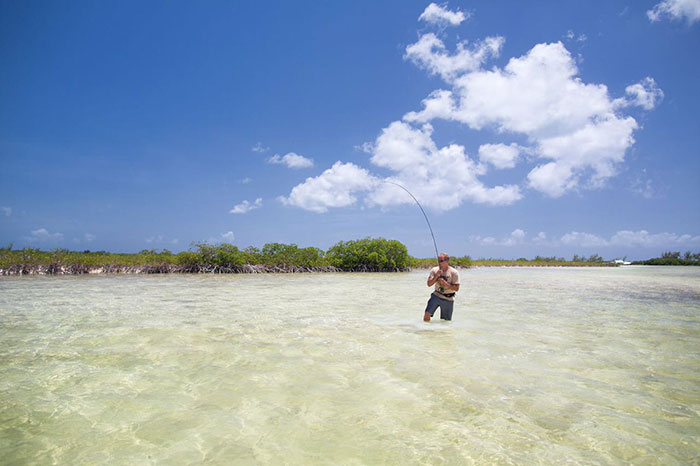
Travis Van Leeuwen fighting a bonefish on a flat in Eleuthera, The Bahamas
Working in the Bahamas no doubt sounds damned intriguing to most reading this interview; what do you like most and least about the region?
The Bahamas and in particular the ‘family’ island of Eleuthera, where the institute is located, is incredible, but not for everyone-as the moto goes. The island is pretty remote, but has some of the most beautiful beaches and flats that I have ever seen. With tourism low, much of this beauty and fishing can be enjoyed in solitude which is rare to find these days.
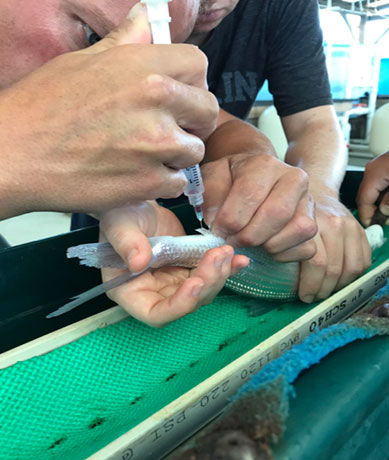
Travis Van Leeuwen taking a blood sample from an anesthetized bonefish for their on-going hormone study looking at the triggers of spawning in bonefish in collaboration with The Bonefish and Tarpon Trust, Florida Atlantic University and The Florida institute of Technology
Believe it or not I haven’t fished much on the other islands- my work keeps me pretty busy on Eleuthera. However, I recently did some fishing on Grand Bahama while attending the Bahamas Bonefish Conference. We saw a few big bonefish but the weather was pretty bad making fishing pretty tough by shore. Traditionally, Andros, Abaco and Grand Bahama are the most visited islands for bonefishing in The Bahamas. On Eleuthera places like Savanah Sound is where the guided trips tend to happen.
What do you consider your home water (non-Bahamian) and what about it keeps you coming back time after time?
To be honest I still enjoy fishing small streams and estuaries back in Canada for salmon and trout. Recent conservation efforts on many of the streams, for example the Coquitlam river, where I used to fish as a young boy, have been incredibly effective – which is great to see. I like the solitude of fishing and the challenge that comes with fishing small streams. We have some big rivers near Vancouver but they are often heavily populated with anglers which I have never been a fan of. I would rather head out and catch a few fish in my local waters than to be lined up alongside a river with 100’s of other anglers.
We’ll have the second part of Travis’ interview and much more bonefish related discussion tomorrow.
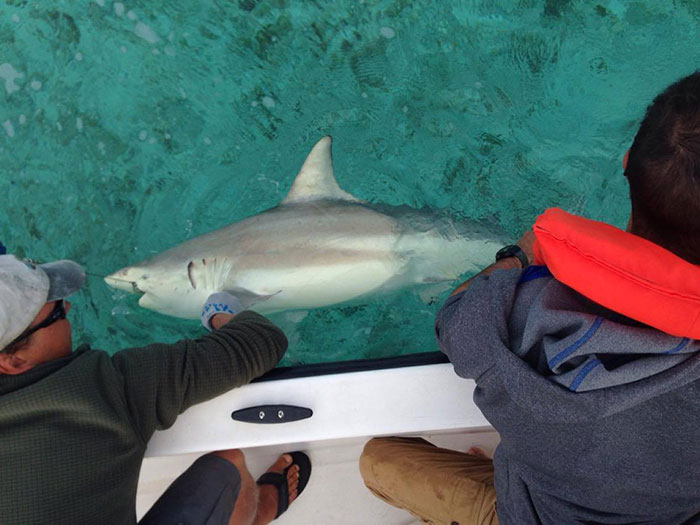
Travis Van Leeuwen and Bill Bigelow secure a Black tip reef shark alongside the boat for insertion of an acoustic tag for Gerogie Burruss’s study looking at predator/prey interactions at bonefish spawning sites.
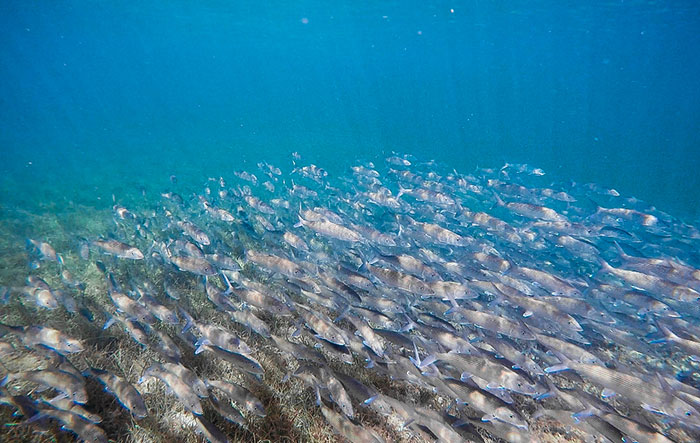
A local spawning aggregation of bonefish
